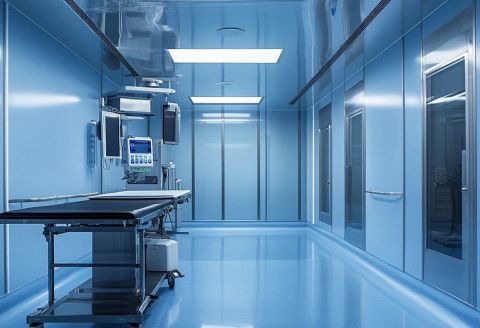Designing for Cleanliness: Sterilization and Material Choices in Medical Products

Medical devices demand precision not just in their function but also in their ability to maintain cleanliness and withstand common sterilization processes. Whether it’s a surgical tool, an implant, or a monitoring device, ensuring sterility is non-negotiable. At Design Department, we carefully consider material choices to create products that meet the highest standards of safety and performance.
𝗠𝗮𝘁𝗲𝗿𝗶𝗮𝗹 𝗦𝗲𝗹𝗲𝗰𝘁𝗶𝗼𝗻 𝗳𝗼𝗿 𝗦𝘁𝗲𝗿𝗶𝗹𝗶𝘁𝘆
The materials used in medical devices must be compatible with sterilization methods such as autoclaving, gamma radiation, or ethylene oxide (EO) gas. Choosing materials that resist degradation while maintaining biocompatibility is critical. For example, metals like stainless steel or titanium and medical-grade polymers such as Peek or Dacron are commonly selected for their ability to withstand repeated sterilization cycles without compromising performance or safety.
𝗗𝗲𝘀𝗶𝗴𝗻𝗶𝗻𝗴 𝗳𝗼𝗿 𝗘𝗮𝘀𝘆 𝗖𝗹𝗲𝗮𝗻𝗶𝗻𝗴
Cleanliness starts with design. Devices with complex geometries or hard-to-reach crevice areas can harbor contaminants, making thorough cleaning difficult. By minimizing crevices, seams, and unnecessary complexity, we create designs that are easier to clean and maintain. This is especially critical for reusable devices that need to perform reliably over multiple uses.
𝗜𝗻𝗰𝗼𝗿𝗽𝗼𝗿𝗮𝘁𝗶𝗻𝗴 𝗖𝗼𝗮𝘁𝗶𝗻𝗴𝘀 𝗮𝗻𝗱 𝗧𝗿𝗲𝗮𝘁𝗺𝗲𝗻𝘁𝘀
Specialized coatings and surface treatments can enhance a device’s resistance to contamination and improve its sterilization capabilities. For instance, hydrophobic coatings can prevent bacterial adhesion, while antimicrobial finishes actively inhibit microbial growth. At Design Department, we evaluate these options based on the device’s intended use and the applicable regulatory requirements.
𝗧𝗲𝘀𝘁𝗶𝗻𝗴 𝗳𝗼𝗿 𝗥𝗲𝗮𝗹-𝗪𝗼𝗿𝗹𝗱 𝗗𝘂𝗿𝗮𝗯𝗶𝗹𝗶𝘁𝘆
Sterilization processes can subject medical devices to extreme temperatures, pressures, and chemical exposure. Ensuring durability under these conditions is a key part of our design validation process. Rigorous testing helps identify potential weaknesses early, allowing us to refine designs and select materials that will perform reliably over the product’s lifecycle.
𝗬𝗼𝘂𝗿 𝗥𝗲𝘃𝗼𝗹𝘂𝘁𝗶𝗼𝗻 𝗔𝘄𝗮𝗶𝘁𝘀
Cleanliness and sterility are foundational to the success of any medical device. At Design Department, we combine thoughtful design, careful material selection, and rigorous testing to ensure your products meet the highest standards of safety and reliability. Let’s collaborate to create medical devices that not only perform but also endure.
𝗕𝗿𝗶𝗮𝗻 𝗟𝗲𝗮𝗱𝗶𝗻𝗴𝗵𝗮𝗺, 𝗣𝗿𝗲𝘀𝗶𝗱𝗲𝗻𝘁 - 𝗗𝗲𝘀𝗶𝗴𝗻 𝗗𝗲𝗽𝗮𝗿𝘁𝗺𝗲𝗻𝘁 𝗜𝗻𝗰𝗼𝗿𝗽𝗼𝗿𝗮𝘁𝗲𝗱
